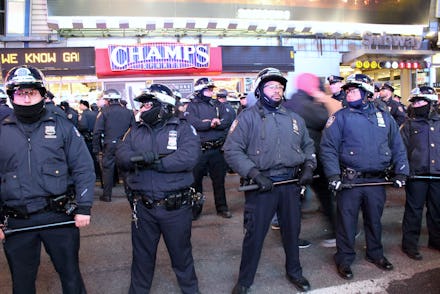One Chart Reveals Something Disturbing About White People's Attitude Towards the Police

The new attention to the impunity with which the police can kill young black men has elicited concern from huge swathes of the public and even conservative icons like Sen. Rand Paul (R-Ky.) and George W. Bush. But a Washington Post round-up of polls suggests that white America's faith in the police to treat people of different races equally is on the rise.
A look at the chart below shows that the percentage of white people who say that they have a "great deal" of confidence that local police officers treat blacks and whites equally has increased since August, when Michael Brown was killed in Ferguson, and breached the 50% mark in December — by far the highest number captured by the Post's aggregation of polls dating back to 1995:
It's worth noting that combining polls from different organizations is a significantly less reliable way to measure opinion than relying on one poll over time. But the shocking jump between September and December in 2014, when debate over the non-indictments in Ferguson and Staten Island escalated, was captured by the same poll (NBC News/Marist College).
A bit more predictably, faith in the police among the black community has consistently remained below 20% and decreased between September and December.
The findings on white opinion on police in their community aren't entirely surprising. When people are reporting their perception of racial prejudice among police, they're also signaling other beliefs: how they think police and crime in their own neighborhood compares to others; where they stand in the broader war over the legitimacy of the police as an institution; whether they think the police are depicted fairly in the media; and whether they think that society has generally made progress against racism.
In other words, people's response on the question of whether or not cops are racist serves as a conduit to a broader set of sociopolitical stances. A significant portion of the white population would rather believe that these incidents are anomalous and alien rather than proof of a trend. If they admitted to the idea of it as a pervasive pattern, that would likely compel them to fundamentally adjust their views on whether or not society is post-racial, and by implication, whether they themselves are. And so many are likely doubling down on their overall trust in the institution.
The reflex for whites to perceive racial discrimination as a problem to which they or their community are immune — despite huge stacks of evidence that show these problems are systemic and span the country — has some parallels in the way conservatives have grown more skeptical of evolution and climate change in recent years. In polls, conservatives responded to the growing media consensus on the need for action on climate change by downplaying the matter, lest they admit that society truly does need to change.
Racial justice reform campaigns will have to remember that even an increase in police brutality incidents isn't going to convince certain segments of the population that wide-scale reform is needed. For many, change is what they're most afraid of.